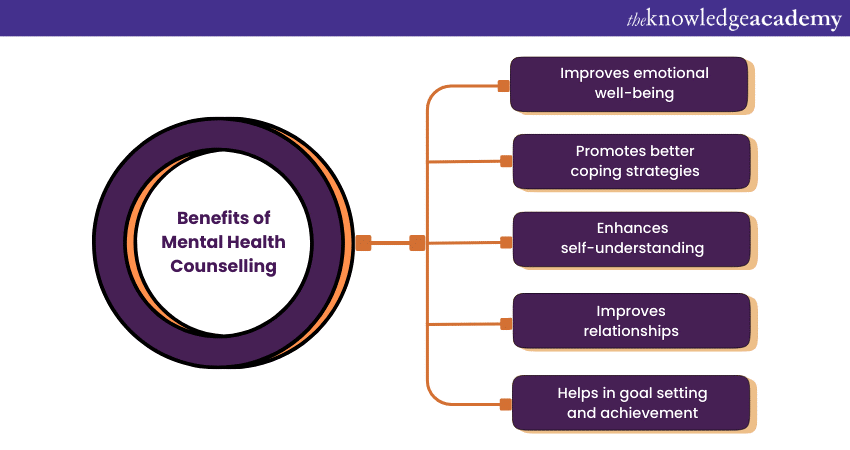Mental Health Counseling Can Be Fun For Everyone
Mental Health Counseling Can Be Fun For Everyone
Blog Article
The Best Guide To Mental Health Counseling
Table of ContentsThe 10-Second Trick For Mental Health CounselingThe smart Trick of Mental Health Counseling That Nobody is Talking AboutMental Health Counseling Things To Know Before You Get ThisThe 9-Second Trick For Mental Health CounselingThe 10-Minute Rule for Mental Health Counseling
With therapy, you can acquire understanding right into your own patterns of habits and interaction, which can cause even more satisfying and satisfying connections with close friends, household, and romantic companions. What we assume, we show up. If you're eaten with adverse feelings and adverse ideas that are hindering your life, treatment can assist., or there are other negative means you behave. Therapy can help you modify those habits that are having a negative influence on your world and partnerships.

Obtaining therapy to attend to certain elements of your life can help you be extra productive in various other locations, including work.

Facts About Mental Health Counseling Revealed
There are also a lot more benefits of therapy than just the ones we have actually gone over., or construct partnerships (romantic or those with family or buddies) in a healthy method.
For the function of the here and now study, perceived benefits and barriers to psychological wellness help-seeking are being discovered. Previous research study discovered that viewed barriers have a significant impact on university student' wellness habits options (Von Ah, Ebert, Ngamvitroj, Park & Kang, 2003). Perceived benefits and obstacles to help-seeking were particularly selected due to their impact on decision-making and inevitably activity (Glanz, Rimer, & Su, 2005).
The present study looks for to take a look at whether or not stigma offers as an obstacle to treatment amongst university student. Eisenberg et al. (2011) proposed that suspicion about therapy effectiveness is one more barrier to getting involved in treatment. Study searchings for exposed that university student supported a number of barriers to taking part in treatment. Mental Health Counseling. Among these were: (1) liking to deal with psychological health and wellness problems themselves, (2) not having adequate time to join treatment, (3) inquiries about whether psychological health therapy is efficient in remediating issues, (4) a belief that stress is typical or the trouble will certainly improve without treatment, (5) absence of money, and (6) stress over what others would certainly think if they learnt about therapy involvement.
Personnel in school psychological wellness facilities might be regarded as hostile, and long wait times for solutions may be "repulsive" for pupils. Variables facilitating more favorable mindsets are usually at the contrary post of those elements identified as barriers.
Facts About Mental Health Counseling Revealed
One in three (34.6%) reported surviving campus and one in 4 (23.3%) reported living with moms and dads. Nearly half of trainees were associated with school companies and 1 in 10 reported being in a society or sorority. Greater than one-third of trainees (38.1%) reported that they learn this here now had a member of the family or friend with a diagnosed mental health condition.

A Biased View of Mental Health Counseling
Univariate F-tests identified specific subscale items that significantly differed. Ladies were much less likely than men have a peek at these guys to regard people who go to counseling as mentally weak, individuals who go to counseling as insane, to really feel that people with mental health issue ought to deal with issues by themselves, that individuals who most likely to therapy as not able to fix issues, that individuals who go to counseling are lazy, and to really feel that people who go to counseling are various from typical individuals in an unfavorable way.
Likewise, study results disclosed that females were significantly less most likely than men to hold stigma-related perspectives. This is constant with previous research which likewise located that males hold greater levels of perceived preconception than women (Chandra & Minkovitz, 2006). Based on research study searchings for, it appears that men may be less most likely than females to seek therapy due to low viewed barriers along with high stigma-related attitudes.
The Only Guide for Mental Health Counseling
In addition, college health and wellness professionals may supply educational programs targeting males with information on the benefits of mental health and wellness treatment and the value of looking for assistance when required. All methods must be assessed with future research study to figure out the impact on university student, especially males. Unlike general populace researches which disclose that females are more probable to choose psychological health and wellness services compared to men (Haunstein et al., 2006; Mackenzie, Gekoski, & Knox, 2006), today research located no considerable differences in the number of regarded obstacles to help-seeking habits based on sex.
Researchers guess that this is mostly because of traditional social standards and gender roles that defined males based upon strength and find absence of psychological expression (Addis & Mahalik, 2003; Ang, Lim, Tan, & Yau, 2004; Mojtabai, 2007). On the whole, there have been mixed results amongst the university student populace relating to sex differences (Rosenthal & Wilson, 2008). This searching for was unexpected and can highlight that those that had obtained counseling had a far better idea of delay times and other "accessibility" barriers that might make it challenging to start treatment. Possibly, participants who have actually received therapy view much more obstacles than participants who have actually not received counseling considering that looking for therapy services once again could entail fear of self-disclosing individual details to a new counselor.
Report this page